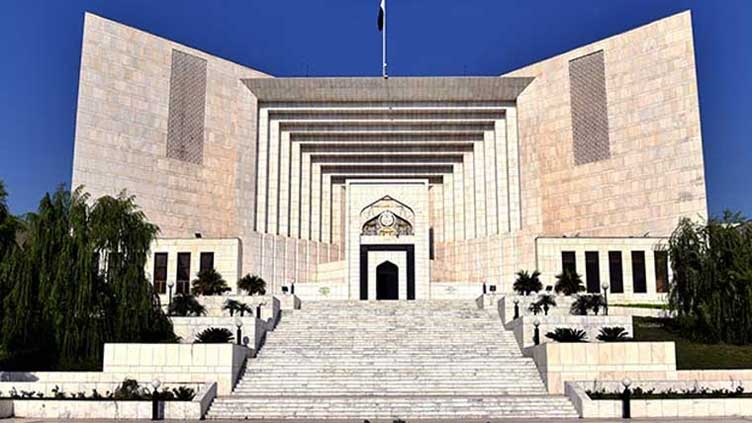SC hints at wrapping up military trials case within two hearings

Pakistan
"How can a law be applied to a conspiracy that has not yet taken place?" asked Justice Mandokhail
ISLAMABAD (Dunya News) – A seven-member constitutional bench of the Supreme Court, led by Justice Aminuddin Khan, indicated that the case challenging the annulment of military trials for civilians could be concluded within the next two hearings.
The bench also included Justices Jamal Khan Mandokhail, Musarrat Hilali, Muhammad Ali Mazhar, Hasan Azhar Rizvi, Naeem Akhtar Afghan, and Shahid Bilal.
During the proceedings, Justice Mandokhail posed a pointed query: "How can a law be applied to a conspiracy that has not yet taken place?" Responding to the bench, the Ministry of Defence’s counsel, Khawaja Haris, argued that the Army Act does indeed cover the act of conspiracy itself.
Justice Mazhar drew a parallel with criminal law, pointing out that Pakistan's Criminal Procedure Code distinctly classifies murder and attempted murder under separate sections. Justice Mandokhail stressed that the criminal justice system is safeguarded under Article 175(3) of the Constitution.
Justice Hilali expressed concern over potential media misinterpretation of judicial remarks. “The press is present here, and I fear how my observations might be portrayed,” she said, before raising a fundamental query: “Can basic rights be taken away from citizens through ordinary legislation? Should a constitutional amendment not have been required to try civilians in military courts?” She further noted that India provides an independent forum for contesting military trials.
More to read: LHC to hear Imran Khan's bail pleas in May 9 cases on April 10
In response, Justice Mazhar clarified that the right to appeal is not currently under judicial scrutiny. Justice Mandokhail added that if the case cannot be brought under Article 8(3A), “then it ends there—what appeal are we even discussing?”
Justice Aminuddin directed that following the conclusion of the defence counsel’s arguments, the Attorney General himself must appear before the court.
At one point, Haris argued that the May 9 incidents were against the interests of the state. However, Justice Mandokhail noted, “Any violation of the law is against state interest—every crime, by its very nature, undermines the state.” He questioned whether the Bolan train attack, for instance, was not a matter of national security.
“The primary role of the armed forces is to defend Pakistan,” Justice Mandokhail added.
In a striking analogy, Justice Mandokhail noted that even a police officer stationed at the Supreme Court gate is tasked with protecting the state. “If he disappears for five minutes, it’s a breach of discipline. Isn't that also a failure of state security?” he asked.
The hearing was adjourned until the next day.


